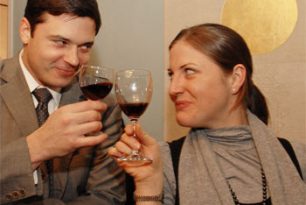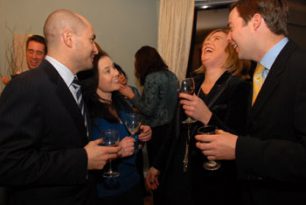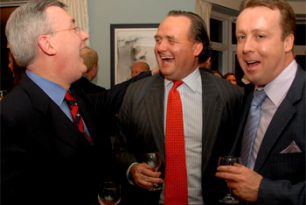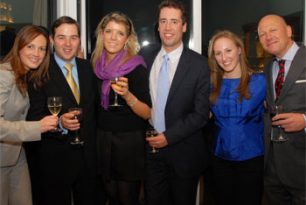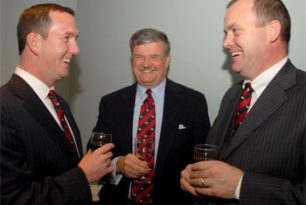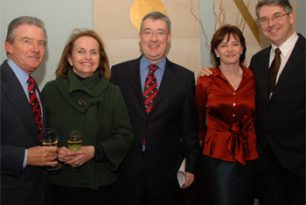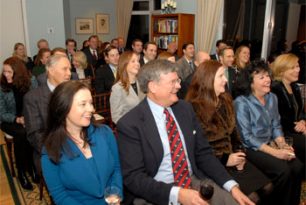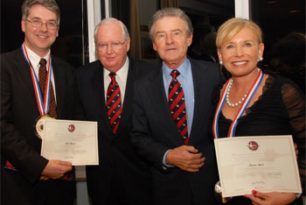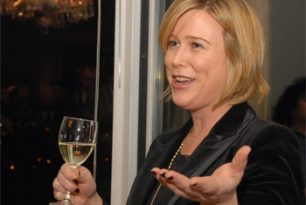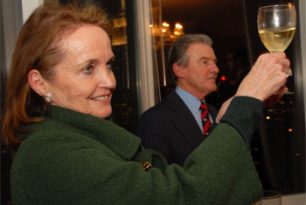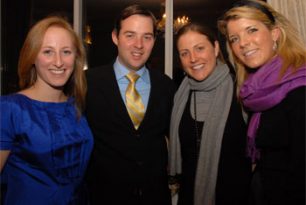January 14th, guests gathered at the private residence of Ireland’s Consul General, Niall Burgess, to ring in the New Year at a WineGeese Celebration. The Consul General made some wonderful remarks on Ireland, wine and the flight of the WildGeese which can be viewed at the bottom of the page.
Following the reflections by Niall Burgess, he and Sharon Bush were both formally inducted into the WineGeese Society.
Guests then gathered for a tasting of the four wines featured which was led by wine expert, Ann Marie Delaney. Ann Marie has been studying wine for over 10 years. She has attended the Mastering Wine Program at the Culinary Institute of America in Napa, California and has also completed the Intermediate and Advanced Levels of the Wine & Spirits Educational Trust. She did a brilliant job of describing the wines and providing guests with some background on the Irish and historical significance of each wine.
AIF Chairman, Loretta Brennan Glucksman raised a toast to the New Year and guests were invited to stay and try their favorite wine. The atmosphere of the evening was terrific and warm, despite the bitter cold outdoors!
Remarks by Ireland’s Consul General, HE Niall Burgess:
Let me begin by saying how touched I am that Kieran McLoughlin would believe I had anything intelligent to say about wine. Like most of my generation, I grew up in an Ireland that was relatively innocent of wine. As a child growing up in Dublin most of our family meals were washed down not with jugs of wine but pots of tea. But if the Irish of my generation were late starters into the world of wine, I suppose we have been quick catchers-up. Great wine is almost taken for granted in Ireland’s many great restaurants and Irish consumers know and appreciate their wine as well as any consumers in Europe or the US.
I want to offer a few meager reflections, less to do with wine than with my own growing appreciation for how complex our history and our experience as a people has been. The first reflection is that wine has been a part of our experience as a people almost from the start of recorded history. As a young archaeologist in Dublin, I worked on the excavations of Viking and Medieval Dublin at Wood Quay. There large quantities of material associated with wine drinking were found: sherds of jugs and flagons used to transport wine from France to Dublin through Bristol.
Medieval Dubliners enjoyed their wine. And not just Dubliners. A poet around this time wrote vision poem (known as Aisling Mhic Chonglinne) where he fantasised about rivers of wine flowing outside his back door. And we know that the wine trade flourished to the 15th Century when Cork and Galway were major ports for wine shipments from Spain and France.
Those links are recalled in Galway’s Spanish Arch and in Christopher Columbus’ trip to Galway where he later wrote he heard stories of land beyond the horizon. They are also recalled in James Clarence Mangan’s great lament: My Dark Rosaleen
O my Dark Rosaleen,
Do not sigh, do not weep!
The priests are on the ocean green,
They march along the deep.
There's wine. . . .from the royal Pope,
Upon the ocean green;
And Spanish ale shall give you hope,
My Dark Rosaleen!
This leads me to a second reflection: that the Wild Geese, when they began leaving Ireland in the 1600’s went very naturally into the wine trade. It was not exotic, not a new departure. It was a business that the Irish knew well – and one of the good things in life that we valued. All the way from James Lynch who fled Ireland with James II to found the dynasty that later became Chateau Lynch Bages – to the O’Reillys and Murphys in Sonoma. And even in that first flight, you can see a foretaste of the pride that Irish would later feel in the achievements of Irish emigrants in America.
Here is Jonathan Swift writing on 2nd August 1732 from the Deanery of Saint Patrick’s Cathedral to his friend Charles Wogan, a Jacobite refugee in the service of Spain:
“I cannot but highly esteem those gentlemen of Ireland , who with all the disadvantages of being exiles and strangers, have been able to distinguish themselves by their valour and conduct in so many parts of Europe, I think above all other nations, which ought to make the English ashamed of the reproaches they cast on the ignorance, the dullness, and the want of courage, in the Irish natives…”
Only five years later, in 1737, the “Memoires” of the Duke of Berwick (“Duc et Pair de France et Générallissme des Armées de sa Majesté”) were published in the Hague.
They make striking reading.
Berwick spent most of his career in the service of Louis XIV and Louis XV. Almost fifty years earlier, however, aged barely 20, he commanded the Jacobite cavalry at the Battle of the Boyne. Berwick makes scant reference to the Boyne, to the Irish at Versailles or to the large number of Wild Geese in the King’s service. He focuses on his own exploits (“la blessure du Duc de Berwick …..ne laissoit pas de l’incommoder beaucoup….”) and his service to the King. Berwick was looking forward, not back.
And so, seven years before the Battle of Fontenoy, the Jacobites in France were already integrating into the French mainstream. The sounds of Gaelic and English were heard less and less at the French court. A distinct Irish culture in France would soon disappear. Only the names would remain. When Patrice McMahon became President of France in 1873, there was relatively little celebration in Ireland or among the Irish in France. Contrast that with the scenes in Ireland and the US less than a century later when JFK became President of this country.
And that leads me to my third reflection, which is that the Irish identity in this country has endured – really against all the odds – for over 300 years. That is a precious and unique inheritance. This month I was lucky enough to be in Portmagee in County Kerry with the NYPD Emerald Society. Many New York police officers trace their Irish ancestry over 150 years to the Famine. Yet for them, their Irishness remains a defining part of what they are. And in Ireland they were stars. People in Kerry lined the streets on New Years Eve to have their picture taken with the NYPD.
That connection, not just of blood but of heart and mind too, is a precious inheritance for all of us. We can’t take it for granted. It could vanish as the Wild Geese vanished into the Kingdoms of Europe with scarcely a backward glance.
You in The American Ireland Fund do more than almost any, to keep that inheritance alive.
At the start of a New Year, as we enter into what we know will be hard times, we have to protect that inheritance. And so, as wine is associated with a strong sense of place and with a sense of celebration, let’s toast that inheritance, and look to securing its future.
